Key Takeaways
- Healthcare consultants review organizational data, tackle challenges, and offer guidance to improve patient care quality and streamline operations.
- Specialties include strategy, compliance, IT, and operations consulting, each addressing distinct aspects of healthcare delivery.
- A career in this field spans varied projects, delivers competitive pay, and provides the chance to drive real improvements in healthcare.
- The need for healthcare consultants is increasing as a result of aging populations, new technologies, and the desire for more affordable care.
As the healthcare industry faces constant change, healthcare consultants are the experts who drive innovation and improvement. They assist businesses in maintaining their efficiency and competitiveness, whether it is through the adoption of new technologies or the management of complex regulations.
With healthcare systems becoming more complicated, there is an increasing demand for qualified consultants because businesses rely on their expertise to lower costs and improve patient care. Healthcare consulting has become one of the most significant and fascinating professions in the sector due to the increasing demand and the opportunity to truly make a difference.
What Is a Healthcare Consultant?
Healthcare consultants are professionals who help healthcare organizations enhance their operations and service quality. They provide expert advice in fields like management, technology, strategy, and regulatory compliance. These consultants work with hospitals, clinics, government agencies, insurance companies, and other healthcare institutions.
Their job is very important, as they assist companies in making better decisions that enhance patient care and optimize the use of resources. By streamlining operations and cutting unnecessary costs, healthcare consultants play a major role in boosting patient outcomes and making healthcare systems more efficient.
What Does a Healthcare Consultant Do?
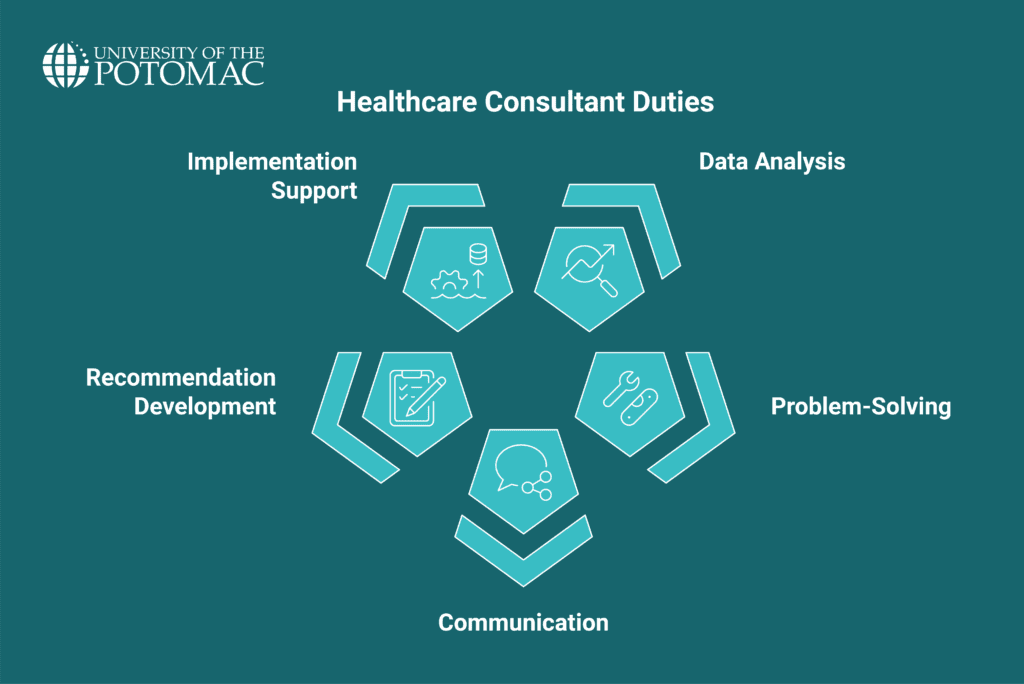
A healthcare consultant assists insurance companies, clinics, hospitals, and other healthcare institutions in enhancing their services and operations. They examine information, spot issues, and suggest changes to improve the effectiveness and affordability of healthcare delivery. Their efforts are crucial to lowering unnecessary costs and enhancing patient care.
Among their primary responsibilities are:
- Data analysis: Finding opportunities for improvement by looking over financial reports, performance data, and patient records.
- Problem-solving: Recognizing issues within the organization and developing strategies to address them, such as reducing patient wait times or improving patient satisfaction.
- Communication: Working closely with doctors, nurses, administrators, and other staff to understand challenges and provide effective solutions.
- Research: Keeping up with changes in healthcare rules, new technology, and industry best practices to offer up-to-date advice.
- Recommendation development: Creating actionable plans to enhance operations, optimize resource use, and improve the quality of care.
- Implementation support: Assisting healthcare organizations in implementing the suggested changes and monitoring their progress.
Healthcare consultants play a key role in improving patient care and making healthcare organizations work more efficiently. For instance, studies reveal that approximately 12% of medical claims are filed with inaccurate codes, which results in payments being either denied or delayed.
Consultants assist healthcare providers in recovering lost money and minimizing administrative problems by correcting these billing errors. Additionally, they simplify processes, which improves patient outcomes and makes healthcare services more effective.
Types of Healthcare Consultants
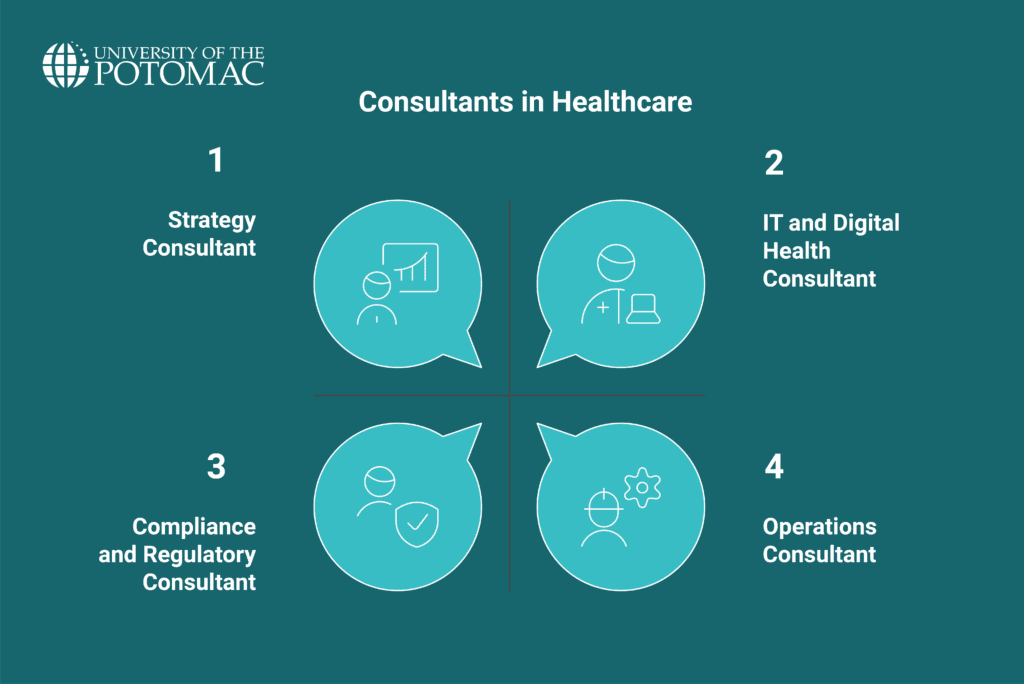
Healthcare consulting spans various fields, with specialized experts addressing the unique needs of healthcare organizations. While some healthcare consultants focus on helping businesses stay in compliance with regulations, others are experts at developing long-term strategies.
In addition, some consultants concentrate on improving daily operations, and others focus on using digital solutions and technologies. Strategy, compliance and regulatory, IT and digital health, and operations consultants are the primary types of healthcare consultants. We’ll examine each of these functions in more detail in the sections that follow.
Strategy consultants
Strategy consultants in healthcare help organizations plan for the future and grow. Their main job is to create long-term plans that improve how a healthcare provider operates, whether it’s a hospital, clinic, or insurance company. They work closely with industry experts to help set goals, improve services, and maintain a competitive edge.
Their duties frequently involve researching market trends, identifying opportunities, and formulating strategies for growing their patient base or breaking into new markets. Strategy consultants are essential to assisting healthcare organizations in overcoming obstacles and achieving long-term success.
Compliance and regulatory consultants
Compliance and regulatory specialists assist healthcare businesses in adhering to legal and regulatory requirements to guarantee that they proceed in an ethical and lawful manner.
Their primary responsibility is to support healthcare professionals in fulfilling legal and industry requirements. By keeping organizations updated on new legislation, these professionals help them avoid legal issues and fines.
They work under laws like the Affordable Care Act, which regulates health insurance operations, and HIPAA, which safeguards patient privacy. Typical customers include insurance companies, clinics, hospitals, and other healthcare institutions subject to stringent rules.
IT and digital health consultants
Consultants in IT and digital health assist healthcare institutions in leveraging technology to enhance patient care and optimize operations. Their primary focus is on assisting healthcare providers with the setup and application of digital tools, including telehealth platforms that enable virtual patient appointments and electronic health record (EHR) systems.
These specialists collaborate with healthcare startups, insurance companies, hospitals, and clinics to ensure that digital solutions function properly and comply with security standards.
They focus on two major trends: electronic health record (EHR) systems, which ensure the secure storage and sharing of patient data, and telehealth, which allows patients to receive care from home.
Operations consultants
Operations specialists can assist healthcare companies in improving daily operations and increasing efficiency. Their primary goals are to identify problems, cut down on waste, and ensure optimal use of the resources at hand. They focus on enhancing processes like patient flow, staff productivity, and supply management.
These consultants typically work with clinics, hospitals, and other healthcare organizations to save expenses and enhance overall performance. They commonly identify issues and provide solutions using approaches like Lean and Six Sigma.
How to Become a Healthcare Consultant
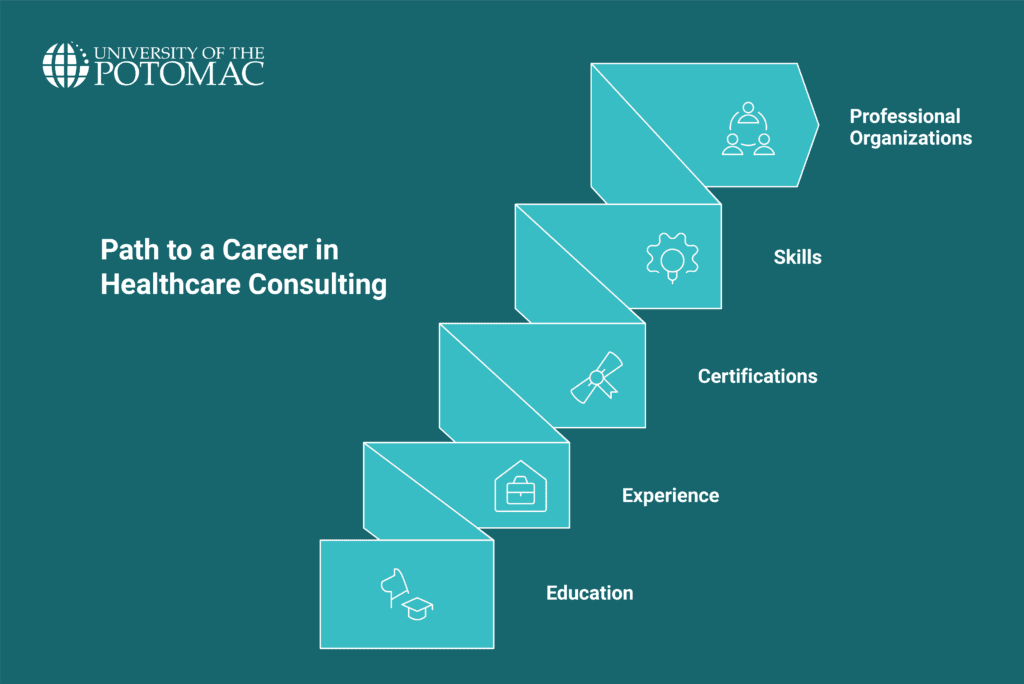
Becoming a healthcare consultant requires a combination of education, experience, and skills in both healthcare and business:
- Education: A bachelor’s degree in a relevant discipline, such as business, nursing, or healthcare administration, is a good place to start. Some positions may require a master’s degree in healthcare management, public health, or business administration (MBA).
- Experience: Get hands-on experience in healthcare environments like clinics, hospitals, or insurance companies. Gaining experience in operations or management can provide you with the practical skills required to be a successful consultant.
- Certifications: Obtaining healthcare-specific credentials like the Certified Healthcare Consultant or Management Consultant (CMC) certifications will help you become more competitive in the job market and increase your credibility.
- Skills: Good communication, problem-solving, and strong analytical skills are essential for healthcare consultants. A thorough understanding of healthcare laws, procedures, and technology is also crucial.
- Professional organizations: To access events, resources, and job openings, join organizations like the Healthcare Consultants Association (HCA) or the Institute of Management Consultants (IMC).
Necessary Skills
To succeed as a healthcare consultant, you must have a range of skills that allow you to evaluate problems, express yourself clearly, and implement ideas. These skills are key to understanding the challenges healthcare organizations face and providing valuable advice.
Interested in pursuing a degree?
Fill out the form and get all admission information you need regarding your chosen program.
This will only take a moment.
Message Received!
Thank you for reaching out to us. We will review your message and get right back to you within 24 hours.
If there is an urgent matter and you need to speak to someone immediately you can call at the following phone number:
- We value your privacy.
Hard skills
Hard skills are technical abilities that healthcare consultants need to do their job effectively. These skills are learned through education, training, and experience and are essential for tasks that require specialized knowledge and can be measured, such as:
- Data analysis and understanding of data
- Knowledge of healthcare laws (like HIPAA and the Affordable Care Act)
- Using healthcare software and tools (like EHR systems)
- Managing projects
- Financial planning and budgeting
- Understanding healthcare industry rules and standards
- Analyzing statistics and making reports
Soft skills
Soft skills are personal qualities that help healthcare consultants work well with others, communicate clearly, and handle situations effectively. These skills are important for building relationships, solving problems, and managing challenges in the workplace. Soft skills include:
- Good communication and people skills
- Problem-solving and thinking critically
- Being flexible and adapting to change
- Leading and managing teams
- Time management and handling multiple tasks
- Negotiating and resolving conflicts
- Understanding and relating to others’ emotions
Pros and Cons of Being a Healthcare Consultant
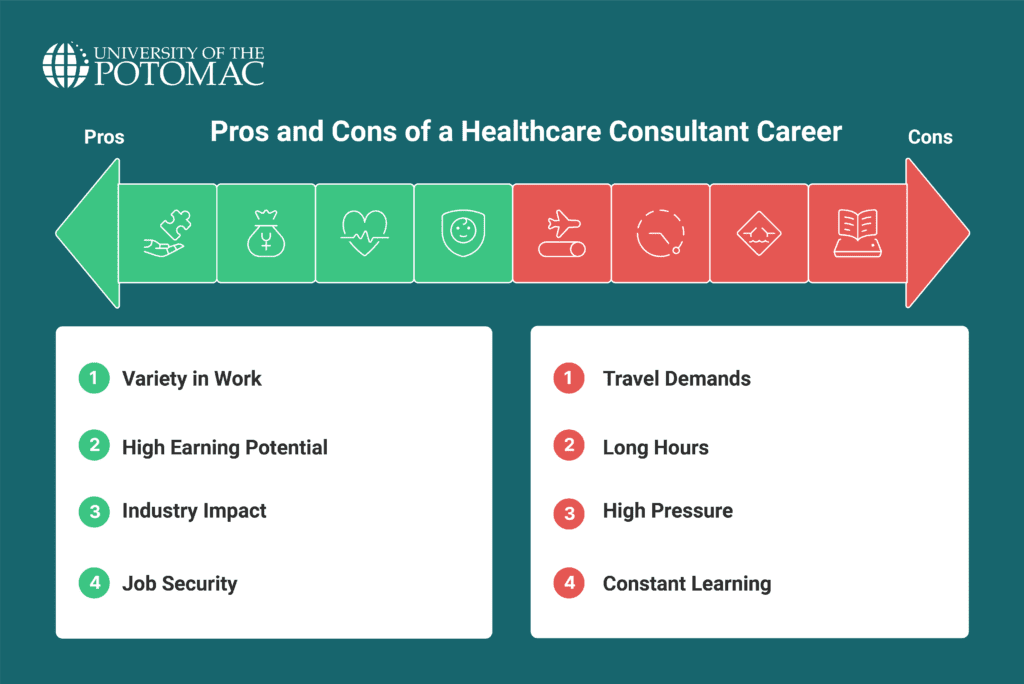
Knowing the pros and cons of being a healthcare consultant can help you decide if this career is right for you. The benefits include the chance to work in a meaningful field where you can help improve patient care and make healthcare more efficient.
However, there are challenges, like meeting client expectations, solving complicated problems, and keeping up with changing rules in healthcare. Let’s explore both the benefits and the challenges in more detail:
Pros
Being a healthcare consultant has several advantages that can make the career both exciting and rewarding. The work is diverse, offers good pay, and gives you a chance to make a real impact in the healthcare industry. Here are some of the main benefits:
- Variety in work: Each project is different, so you get to work on new challenges all the time.
- High earning potential: Healthcare consultants can earn high salaries, especially as they gain experience.
- Industry impact: You can help improve healthcare systems, make care better for patients, and make healthcare more efficient.
- Job security: There is a steady demand for healthcare consultants, making this a stable career choice.
Cons
While there are many benefits, being a healthcare consultant also comes with some challenges. These can increase job stress and have an impact on your work-life balance. Here are some of the key downsides:
- Travel demands: Consultants often need to travel to meet clients, which can be tiring and take away from personal time.
- Long hours: You may need to work extra hours to meet deadlines and handle multiple projects.
- High-pressure environment: The job can be stressful, especially when clients expect quick and effective results.
- Constant learning: To stay up-to-date with healthcare trends and regulations, consultants need to keep learning.
Salary and Career Outlook
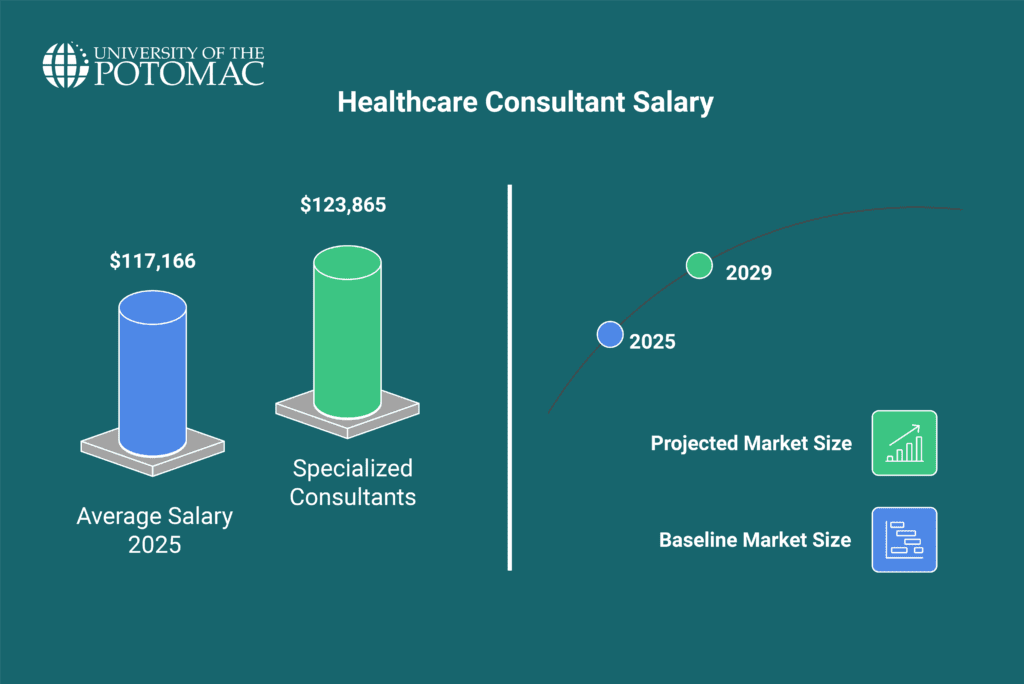
Healthcare consulting has a promising future and offers competitive compensation, which varies according to experience, region, and specialty.
In 2025, the average salary for a healthcare consultant in the U.S. is around $117,166 a year. Consultants who specialize in areas like strategy or IT can earn even higher salaries, sometimes reaching $123,865 annually.
The demand for healthcare consultants is growing fast. The healthcare consulting market is expected to increase from $32.5 billion in 2025 to $55.85 billion by 2029, with an annual growth rate of about 14.5%. This growth is driven by things like new healthcare technologies, telehealth, and an aging population.
Additionally, the BLS predicts that healthcare-related jobs will grow much faster than other occupations by 2033.
Conclusion
In summary, healthcare consulting is a valuable and dynamic career that allows professionals to make a significant impact by improving healthcare systems, enhancing patient care, and increasing efficiency. With growing demand and diverse opportunities across various specializations, it’s an exciting field with strong earning potential and the chance to drive meaningful change.
If you’re interested in pursuing this path, check out Potomac’s programs to start your journey in healthcare consulting today!
Frequently Asked Questions
What degree is best for healthcare consulting?
A degree in healthcare administration, business, or a related field like nursing or public health is ideal for healthcare consulting.
What certifications can help strengthen your résumé for entry-level healthcare consulting roles?
Certifications like Certified Management Consultant (CMC) or Certified Healthcare Consultant (CHC) can enhance your résumé.










